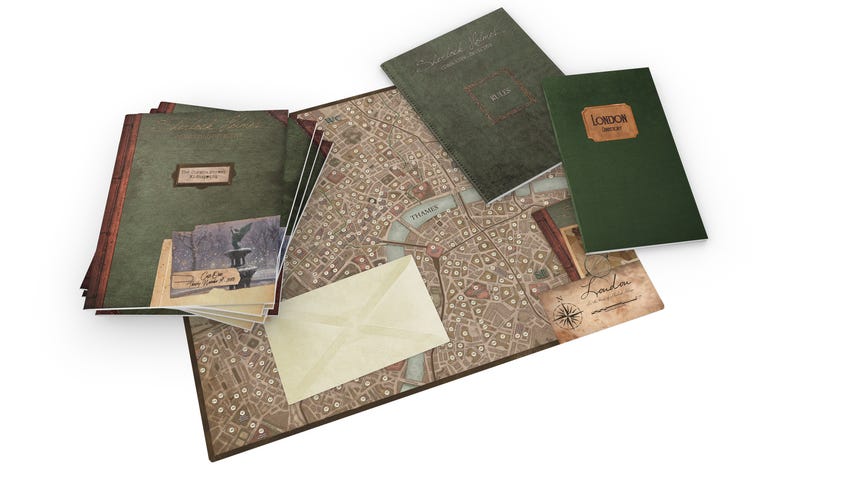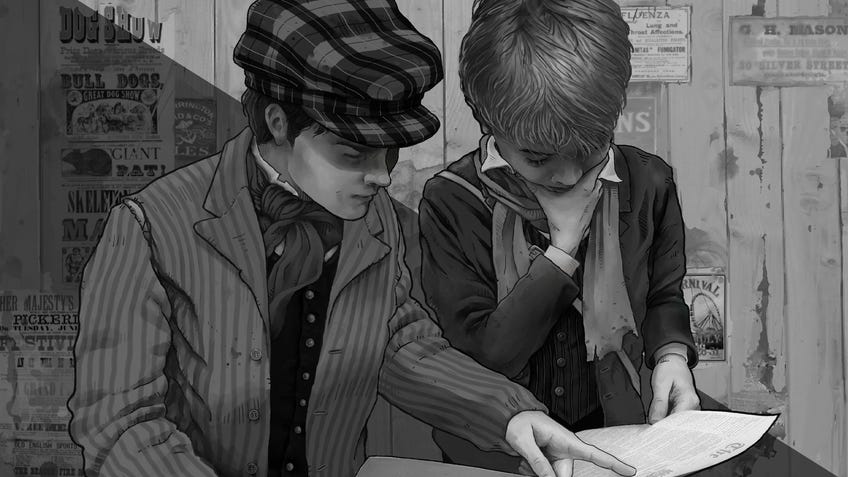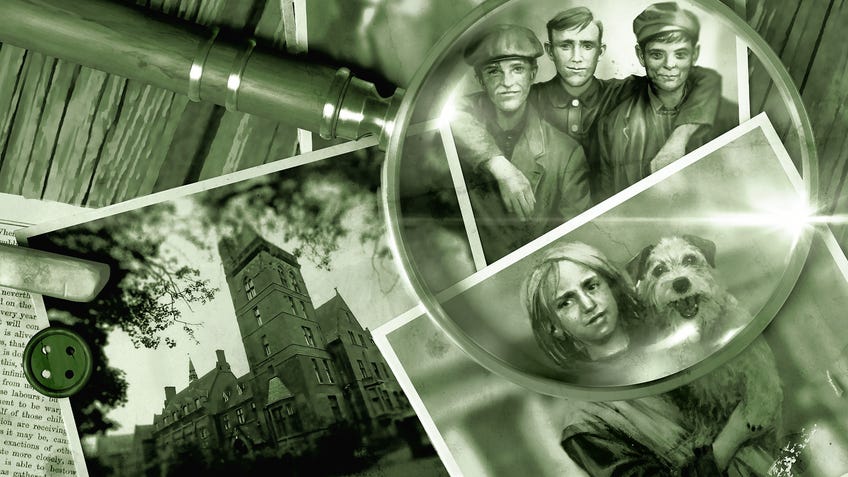Sherlock Holmes: Consulting Detective - The Baker Street Irregulars board game review: the classic mystery series has never been better
Exemplary, my dear Watson.
What if I told you that for about £40 you could get a gorgeous box of mysteries set in the world of Sherlock Holmes, filled with genuine intrigue, smart and funny writing, and most importantly: some excellent cases to crack? If that sounds exciting, I’ve got some good news, as there’s a new instalment in the Sherlock Holmes: Consulting Detective series.
For the unfamiliar, Sherlock Holmes: Consulting Detective is an incredible collection of games that completely deserves your attention if you have even a passing interest in detective mysteries - which seems to be an absurdly popular genre for board game fans. First published almost four decades ago, the series now spans a number of games with a whopping total of 40 fully-fledged stories for you to experience.
That brings us to the new kid on the block - or, rather, KIDS on the block: the Baker Street Irregulars. Consulting Detective’s latest box is so good that it may have actually raised the bar of the series as a whole. It’s the perfect introduction to the Consulting Detective series if you’re new, and essential if you’re a long time fan.
Like its predecessors, The Baker Street Irregulars comes with a series of props that act as tools for your investigations. Every case in the box is contained in one of ten books that provide the introduction to the mystery, the questions you’ll need to answer to earn points at the end of the game and a full explanation of how Holmes himself managed to crack it. There’s also an intricate map of central London, split into regions and dotted with numerical addresses that allow you to visit anywhere in the city as part of your investigation.
Everything you do in Consulting Detective is tied to a location on this map, which is then turned into code by combining the number of the block of buildings with the region it's in. For example, if I wanted to head to Scotland Yard to dunk on Lestrade, I can find Scotland Yard on the map - 13 South West - and turn to 13SW in the case book.
Every location you visit as part of your investigation will feature some locational detail or characters who will hopefully divulge some important information on what you’re searching for. Hopefully is the operative word as, be warned, not every lead is relevant and some are intentionally misleading red herrings to throw you off the scent.
Baker Street Irregulars is the perfect introduction to the Consulting Detective series if you’re new, and essential if you’re a long time fan.
The locations include regular informants that you’ll routinely check in with as part of investigations. You might knock on the door of criminologist H. R. Murray for some analysis of substances and items found at crime scenes, Langdale Pike for some high society gossip or ol’ Porky Shinwell of the Rat & Raven pub for info on any dodgy dealings or underworld activity happening on the streets. If there’s anyone not on your immediate list of contacts, you can consult the London Directory for a comprehensive list of the residents and businesses of central London.
Every case in the box is also accompanied by that morning’s edition of the Times newspaper for you to browse the comings and goings of London, as well as important events from around the country and the rest of the world. The newspapers are a vital tool for finding specific suspects and background information on your cases, but they’re also littered with nonsense which can make them pretty tricky to parse.
With all those bits and bobs at your disposal, the game is delightfully easy to play. You’ll be given your pre-amble at the start of the book - after that, where you choose to go, who you choose to speak to and even when you choose to end the adventure is completely up to you.

To further the story you just pick a location to visit, mark the code down as one of the leads that you’ve followed and take notes on the information you find. If you feel you’ve run out of leads or are sure you’ve cracked the case, you simply turn the case book upside down and answer two series of questions. The first asks for the specific hows and whys of the main story, but to make up some extra points you can also give the second set a go. These are usually concerned with some extra details that the keen-eyed may have picked up, along with one or two side-quest conundrums that are optionally solvable additions.
Not only is Baker Street Irregulars the best Consulting Detective game yet, it introduces a few key features that make it a much more welcoming starting place for new players.
The game not only gives you a score based on your performance, but also compares you to the room-pacing, monologue-delivering consulting detective himself. Sherlock provides the full breakdown of each case at the end of the book and always scores 100 points - usually with a ridiculously small number of leads. For every extra lead you followed compared to Holmes you’ll be deducted points while, if you’re some kind of detective demi-god, you’ll gain five for every fewer lead. Don’t worry: it’s very unlikely you’ll ever need to worry about outperforming Sherlock when it comes to pure efficiency, but if you’re smart and pay attention to anything that could help with the second set of questions it is possible to outscore him. Take it from Dicebreaker’s very own gumshoe here.
If you’re sold by that general premise, the logical conclusion might be to pick up the first box in the Consulting Detective series, The Thames Murders & Other Cases - a remake of the original 1981 game - and work your way forward. It’s not quite that simple, because not only is Baker Street Irregulars the best Consulting Detective game yet, it also introduces a few key features that make it a much more welcoming starting place for new players.
The ten cases contained within this lovely green box centre themselves around the titular group led by Wiggins who, despite being the group that the players supposedly control in all of the Consulting Detective games, have never been fully explored until now. You experience each case from their perspective, along with some new additions to the cast to give Wiggy a helping hand, including Simpson the matchstick seller and Tinker the mudlark. This motley crue, combined with the reappearing cast of characters that make up your informants list, become like close friends throughout the box - you find yourself really caring about them as little hints of their character and glimpses at their past pop up in the text.
I can’t stress enough just how good the writing is.
I can’t stress enough just how good the writing is in this box. There’s a mountain of detective board games out there. Many rely on a gimmick - QR codes, semi-cooperative play, piles of cards - or massive paragraphs of text that quickly become exhausting to read. When you encounter a section of text in one of these cases it’s euphoric. Sure, that means clues for the case, but it also means more characterisation for the cast (including the mandatory silly voices to read NPC dialogue in), great little jokes and snapshots of Victorian melancholy. The writing has always been good in Consulting Detective - credit where credit is due to original designers Gary Grady, Suzanne Goldberg and Raymond Edwards - but series newcomer Dave Neale without a doubt now carries the accolade for best Sherlock writer in my book.
Stellar wordsmithing is not all that makes this box stand out. A whole host of quality-of-life improvements make things smoother and more forgiving for the players. There’s the player aid - new to Consulting Detective as of this set. As well as a slightly more detailed look at your list of informants, making them easier to peruse, on the reverse side you’ll find an alphabetical code for each of the ten cases which you can tick off whenever you reach a certain point in the story.

In previous Consulting Detective entries if you didn’t follow leads in almost the exact order the game expected, you’d often jump into bits of the investigation without proper context and be confused as to what the characters were talking about. In The Baker Street Irregulars, sections of the text are locked unless you have one of those letters on your player aid circled. By adding in these checkpoints whenever you learn something of note - be it a new name, piece of evidence or, in some cases, tool for you to use - you’ll always see the main beats of the story in the right order. This is great for new players because, not only does it give you a hint that you’ve just learned something potentially really important, the fresh leads you can return to make it feel like you’ve cracked a part of the case and opened up a new avenue of investigation.
The checkmarks allow Neal to do some clever gameplay tricks that reminded me of choose-your-own-adventure-style board game Legacy of Dragonholt, including the opportunity to make divergent choices in the story itself. One example sees the players caught as the gang sneaks into a building, before being chased down the street - afterwards, you can go back to the same building and search it because the inhabitants are still out searching for you. There’s a greater sense of weight to the leads you follow and you feel much more involved in the story rather than a silent bystander only there to observe.
A great example of how this can be really useful is in the visiting Sherlock mechanic that’s been around since the first Consulting Detective box. If you’re ever really stuck during a case, you can visit 221b Baker Street and Holmes will give you some hints as to where to focus your investigation. The problem with this in previous games was that because the book had no idea where in the story you were, you could have the majority of the case completely spoiled for you with no real way of telling how much you were going to skip by asking for a hint. In Baker Street Irregulars, Holmes will instead give you a number of sections marked by the letters you’ve found so far - meaning you’ll only get hints if you’ve already received the information needed to figure out what he’s telling you about. Clever.

These boxes will always live and die by the cases inside them - and it’s difficult to tell you about what you’re going to face without getting into spoiler territory. I can tell you that there’s kidnappings, murders, organised crime, political intrigue, corporate espionage and much much more. I enjoyed Neale dipping into just how dangerous it was to be a kid in Victorian England, with references to the Children's Charter and other events popping up in the newspapers.
Aside from one chapter - The Three Customers, which focused a little too heavily on a time-management gimmick and felt dull in comparison to its neighbours - every case in this box left me thoroughly entertained from start to finish and completely enraptured by the mysteries they presented.
Now I’m going back to older Consulting Detective boxes to get my next fix, I'm finding them slightly wanting in comparison, if still enjoyable.
My favourite three cases were The Red River Valley, which introduces some intercontinental intrigue; The Promise, which delves into the backstory of one of the main characters in the box; and epic finale The Death of a Detective. Throughout these cases there were moments that flipped everything on its head, the cases never being as simple as they seem, with the finale being a pièce de résistance featuring multiple weaving storylines converging, reappearances of characters from older cases and a fantastic finish with several possible endings depending on how you fared.
The Baker Street Irregulars is an absolute must-buy for me. I can’t even begin to express just how much fun I had with it - to the point that now I’m going back to older Consulting Detective boxes to get my next fix, I'm finding them slightly wanting, if still enjoyable.
If you have even a passing interest in crimes and capers, Victorian England, Sherlock Holmes stories, or just great writing I urge you to go out and grab this box. It’s an absolute treat.


